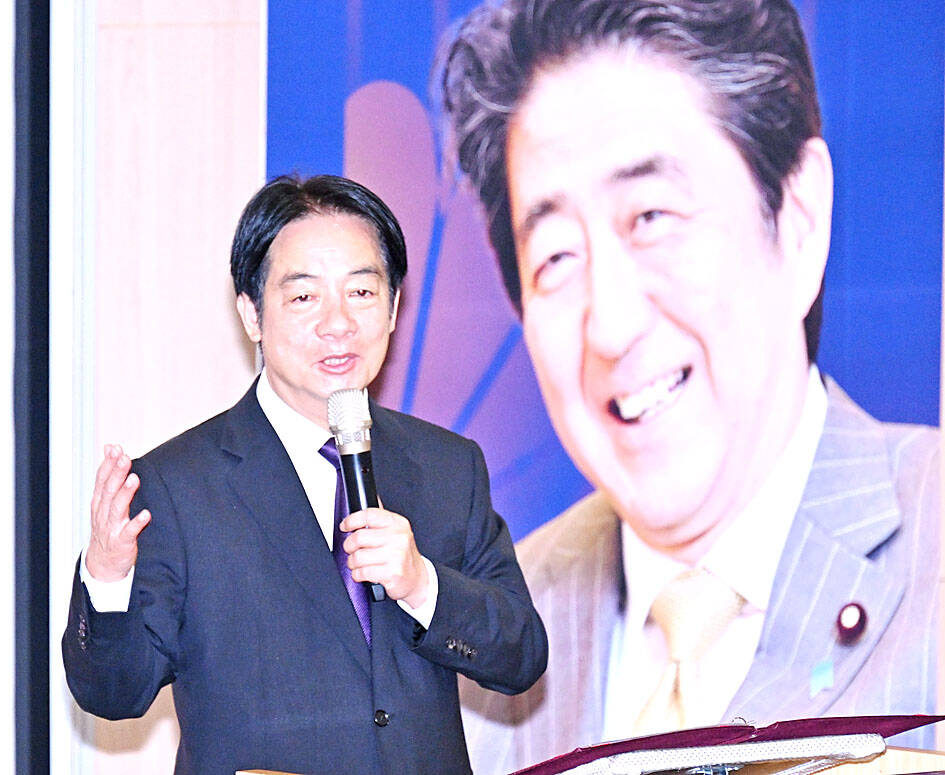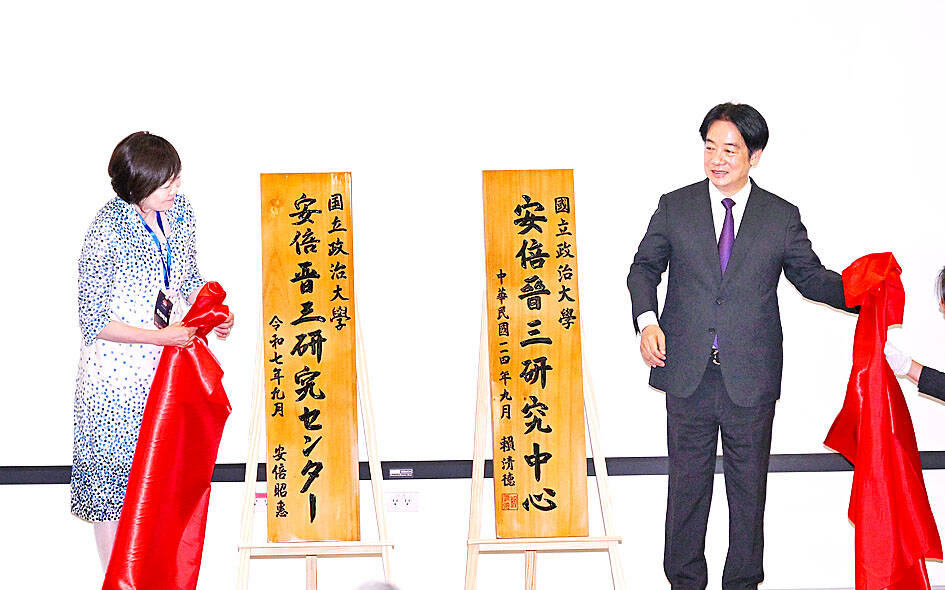President William Lai (賴清德) yesterday lauded the establishment of a research center in Taipei named after late Japanese prime minister Shinzo Abe as an important platform for developing Taiwan-Japan cooperation.
Speaking during the opening ceremony of the research center at National Chengchi University’s (NCCU) College of International Affairs in Taipei, Lai said Abe, the longest-serving prime minister in Japanese history, was not only a great politician, but also a close friend of Taiwan.
Following the Tainan and Hualien earthquakes in 2017 and 2018 respectively, Abe not only expressed condolences to Taiwanese, but also offered help in post-disaster relief and rebuilding, Lai said.

Photo: Fang Pin-chao, Taipei Times
After stepping down as prime minister in September 2020, Abe promoted the idea that “a Taiwan contingency is a contingency for Japan,” against the backdrop of increased Chinese military pressure on Taiwan.
Abe was a visionary, Lai said, adding that when Abe noticed that China’s defense budget was increasing year by year, which would inevitably threaten the peace and stability of the Indo-Pacific region, Abe flew to the US to meet with US President Donald Trump before the latter’s first term began and explained the Indo-Pacific situation, which led to the idea of a free and open Indo-Pacific region.
The idea was later adopted by the US and its allies, leading to the formation of the Quadrilateral Security Dialogue, or Quad, between Japan, the US, Australia and India, Lai said.

Photo: Fang Pin-chao, Taipei Times
“We have Abe’s foresight to thank for the peace we are enjoying in Taiwan now, rather than war,” Lai said.
When Trump withdrew the US from the Trans-Pacific Partnership, it was Abe who took on the responsibility and led Indo-Pacific nations to promote its successor, the Comprehensive and Progressive Agreement for Trans-Pacific Partnership, he said.
Abe valued not only the bilateral relationship or point-to-point connections between countries, but also a diplomatic strategy that looked at international relations from a global perspective, Lai said, adding that Abe worked to advance foreign relations with a broader view, which also earned Japan further recognition from the international community.
Abe also proposed a highly visionary semiconductor strategy, he said.
The Japan Semiconductor Strategy Members’ Alliance, established by former Japanese minister of economy, trade and industry Akira Amari, successfully facilitated Taiwan Semiconductor Manufacturing Co’s (台積電) investment in Japan, Lai said.
Taiwan and Japan can cooperate further in the semiconductor industry, he added.
Abe’s death was not only a loss for Japan and Taiwan, but for the whole world, he said.
The opening of the research center coincided with Abe’s birthday on Sept. 21, which is also designated the International Day of Peace by the UN, he said, expressing hope that the center would cultivate talent, and promote the study of Abe’s ideals and policies, and become an important cooperation platform between the two countries.
Joining the ceremony in Taipei yesterday was Abe’s widow, Akie Abe, who expressed gratitude to Taiwan and NCCU for establishing the center in her late husband’s name.
Although not a politician herself, Akie Abe said she came to better understand her husband’s ideals after his passing.
She said that she hoped to continue fostering the cordial exchanges between Taiwan and Japan that flourished under his leadership, so that his legacy could be carried forward by future generations.
Shinzo Abe was fatally shot with a makeshift shotgun during an election campaign event in Nara, Japan, on July 8, 2022. He was 67. He served as Japan’s prime minister in 2006 and 2007, and again from 2012 to 2020.
Lai, then-vice president, attended Shinzo Abe’s wake in Tokyo.
In an article published by the Los Angeles Times a few months before his death, Shinzo Abe urged the US to abandon its long-standing policy of “strategic ambiguity” toward Taiwan, under which Washington has not committed to sending troops in the event of a Chinese invasion.
However, his nationalist policies also made him a controversial figure in Japanese politics.
One major controversy arose in 2015, when his government revised security legislation to allow the overseas deployment of Japanese troops for combat missions, a move that led to protests at home.

Right-wing political scientist Laura Fernandez on Sunday won Costa Rica’s presidential election by a landslide, after promising to crack down on rising violence linked to the cocaine trade. Fernandez’s nearest rival, economist Alvaro Ramos, conceded defeat as results showed the ruling party far exceeding the threshold of 40 percent needed to avoid a runoff. With 94 percent of polling stations counted, the political heir of outgoing Costa Rican President Rodrigo Chaves had captured 48.3 percent of the vote compared with Ramos’ 33.4 percent, the Supreme Electoral Tribunal said. As soon as the first results were announced, members of Fernandez’s Sovereign People’s Party

EMERGING FIELDS: The Chinese president said that the two countries would explore cooperation in green technology, the digital economy and artificial intelligence Chinese President Xi Jinping (習近平) yesterday called for an “equal and orderly multipolar world” in the face of “unilateral bullying,” in an apparent jab at the US. Xi was speaking during talks in Beijing with Uruguayan President Yamandu Orsi, the first South American leader to visit China since US special forces captured then-Venezuelan president Nicolas Maduro last month — an operation that Beijing condemned as a violation of sovereignty. Orsi follows a slew of leaders to have visited China seeking to boost ties with the world’s second-largest economy to hedge against US President Donald Trump’s increasingly unpredictable administration. “The international situation is fraught

MORE RESPONSIBILITY: Draftees would be expected to fight alongside professional soldiers, likely requiring the transformation of some training brigades into combat units The armed forces are to start incorporating new conscripts into combined arms brigades this year to enhance combat readiness, the Executive Yuan’s latest policy report said. The new policy would affect Taiwanese men entering the military for their compulsory service, which was extended to one year under reforms by then-president Tsai Ing-wen (蔡英文) in 2022. The conscripts would be trained to operate machine guns, uncrewed aerial vehicles, anti-tank guided missile launchers and Stinger air defense systems, the report said, adding that the basic training would be lengthened to eight weeks. After basic training, conscripts would be sorted into infantry battalions that would take

GROWING AMBITIONS: The scale and tempo of the operations show that the Strait has become the core theater for China to expand its security interests, the report said Chinese military aircraft incursions around Taiwan have surged nearly 15-fold over the past five years, according to a report released yesterday by the Democratic Progressive Party’s (DPP) Department of China Affairs. Sorties in the Taiwan Strait were previously irregular, totaling 380 in 2020, but have since evolved into routine operations, the report showed. “This demonstrates that the Taiwan Strait has become both the starting point and testing ground for Beijing’s expansionist ambitions,” it said. Driven by military expansionism, China is systematically pursuing actions aimed at altering the regional “status quo,” the department said, adding that Taiwan represents the most critical link in China’s